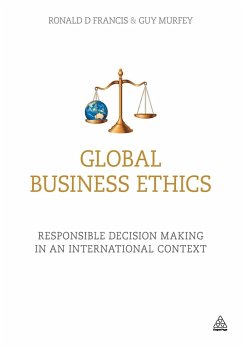Ronald D Francis, Guy Murfey
Global Business Ethics
Responsible Decision Making in an International Context
Ronald D Francis, Guy Murfey
Global Business Ethics
Responsible Decision Making in an International Context
- Broschiertes Buch
- Merkliste
- Auf die Merkliste
- Bewerten Bewerten
- Teilen
- Produkt teilen
- Produkterinnerung
- Produkterinnerung
Taking a fresh look at one of the key foundations of business--the need to conduct business responsibly, sustainably, and within a sound ethical framework--"Global Business Ethics "is a guide for ethical decision making within the international business landscape. Enriched with worked examples of ethical dilemmas and their solutions, this book goes beyond theory to real-world business decisions.It includes a chapter focused solely on legal ethics and discusses ethical gradualism and quantification of ethics.The final chapters take an in-depth look at the practical application of ethics in…mehr
Andere Kunden interessierten sich auch für
![Emerging Global Business Ethics Emerging Global Business Ethics]() Emerging Global Business Ethics102,99 €
Emerging Global Business Ethics102,99 €![Food Business and the Global Water Challenge Food Business and the Global Water Challenge]() Florian HarkortFood Business and the Global Water Challenge14,99 €
Florian HarkortFood Business and the Global Water Challenge14,99 €![You Can't Make Money from a Dead Planet You Can't Make Money from a Dead Planet]() Mark ShaylerYou Can't Make Money from a Dead Planet58,99 €
Mark ShaylerYou Can't Make Money from a Dead Planet58,99 €![A Primer on Critical Thinking and Business Ethics A Primer on Critical Thinking and Business Ethics]() SJ Oswald A. J. MascarenhasA Primer on Critical Thinking and Business Ethics120,99 €
SJ Oswald A. J. MascarenhasA Primer on Critical Thinking and Business Ethics120,99 €![Business Ethics Business Ethics]() Bob TrickerBusiness Ethics94,99 €
Bob TrickerBusiness Ethics94,99 €![Happiness and Virtue Ethics in Business Happiness and Virtue Ethics in Business]() Alejo José G. SisonHappiness and Virtue Ethics in Business113,99 €
Alejo José G. SisonHappiness and Virtue Ethics in Business113,99 €![Corporate Social Responsibility in the Global Business World Corporate Social Responsibility in the Global Business World]() Corporate Social Responsibility in the Global Business World77,99 €
Corporate Social Responsibility in the Global Business World77,99 €-
-
-
Taking a fresh look at one of the key foundations of business--the need to conduct business responsibly, sustainably, and within a sound ethical framework--"Global Business Ethics "is a guide for ethical decision making within the international business landscape. Enriched with worked examples of ethical dilemmas and their solutions, this book goes beyond theory to real-world business decisions.It includes a chapter focused solely on legal ethics and discusses ethical gradualism and quantification of ethics.The final chapters take an in-depth look at the practical application of ethics in business life and advice on avoiding and solving ethical problems an organization may face.
Hinweis: Dieser Artikel kann nur an eine deutsche Lieferadresse ausgeliefert werden.
Hinweis: Dieser Artikel kann nur an eine deutsche Lieferadresse ausgeliefert werden.
Produktdetails
- Produktdetails
- Verlag: Kogan Page
- Seitenzahl: 248
- Erscheinungstermin: 1. November 2015
- Englisch
- Abmessung: 244mm x 170mm x 14mm
- Gewicht: 435g
- ISBN-13: 9780749473952
- ISBN-10: 0749473959
- Artikelnr.: 42955204
- Herstellerkennzeichnung
- Libri GmbH
- Europaallee 1
- 36244 Bad Hersfeld
- gpsr@libri.de
- Verlag: Kogan Page
- Seitenzahl: 248
- Erscheinungstermin: 1. November 2015
- Englisch
- Abmessung: 244mm x 170mm x 14mm
- Gewicht: 435g
- ISBN-13: 9780749473952
- ISBN-10: 0749473959
- Artikelnr.: 42955204
- Herstellerkennzeichnung
- Libri GmbH
- Europaallee 1
- 36244 Bad Hersfeld
- gpsr@libri.de
Ronald Francis is Professor Emeritus at the College of Law and Justice at Victoria University in Australia. He is the author of 22 books, including Birthplace, Migration and Crime (Palgrave-Macmillan), The Meetings Handbook (Anthem Press), and Ethics for Psychologists (Wiley-Blackwell). Guy Murfey is a psychologist and lawyer. He has held numerous leadership positions, most recently at the Australian Tax Office's (ATO) Legal Services Branch, where he was responsible for the day-to-day running of litigation. Throughout his career, he has focused on organizational culture and driving effective change.
Preface
Acknowledgements
Part One The necessity, justification and research into cross-cultural
business ethics
01 Background to ethics
Introduction
Purpose of the book
Moral versus aesthetic values
The necessity for business ethics
Advantages of being ethical
Corporate governance
Goodwill
The Marlowe Declaration
'Ends justifies the means' debate
Is ethics a luxury?
Conclusion
Recommended reading
02 Justification for ethics
Introduction
Ethics is rational
Ethics is profitable
Ethics is mandated by law
Ethics helps companies maintain their relationship with shareholders
Ethics can facilitate opportunities
Ethics is essential for business record keeping
Ethics assists in the management of privacy
Ethics is core to the sustainability of the financial system
Discriminant analysis and decision making
Conclusion
Recommended reading
03 Cross-cultural issues in business ethics
Introduction
Hofstede's model
National and environmental factors
Learning from other cultures
Corruption
Conclusion
Recommended reading
04 Organizational factors in business ethics
Introduction
The organization and ethics
Other organizational issues
Conclusion
Recommended reading
05 Individual factors in business ethics
Introduction
The individual and ethics
Psychological theories and ethics
Social
Physical factors
Conclusion
Recommended reading
Part Two Theoretical issues in business ethics
06 Theoretical approaches
Introduction
The nature of ethics
Ethical principles and exceptions
Theories of morality
Bases of ethical theories
Excellence
Conclusion
Recommended reading
07 Legal aspects of ethics
Introduction
Legal or moral?
Commonality between law and ethics
Codes of conduct as law
Conclusion
Recommended reading
Part Three Solving problems
08 Ethical gradualism, culture, quantification and codes
Introduction
Ethical gradualism
Creating an ethical corporate culture
Fostering an ethical culture
Learning strategies
Sensitizing to ethical issues
The importance of a learning strategy for an ethical culture
Syllabus matters
Essential elements of an ethical corporate structure
The importance and principal features of ethical codes
Conclusion
Recommended reading
09 Investigating ethical breaches
Introduction
Should there be an investigation?
How to resolve an ethical dilemma
Other factors for consideration
Conclusion
Recommended reading
10 International standards and first principles
Introduction
OECD guidelines for multinational enterprises
OECD principles on corporate governance
First level principles
Other issues relating to principles
Conclusion
Recommended reading
Ethical codes: ready reference guide (glossary of international codes
related to ethics)
References
Index
Acknowledgements
Part One The necessity, justification and research into cross-cultural
business ethics
01 Background to ethics
Introduction
Purpose of the book
Moral versus aesthetic values
The necessity for business ethics
Advantages of being ethical
Corporate governance
Goodwill
The Marlowe Declaration
'Ends justifies the means' debate
Is ethics a luxury?
Conclusion
Recommended reading
02 Justification for ethics
Introduction
Ethics is rational
Ethics is profitable
Ethics is mandated by law
Ethics helps companies maintain their relationship with shareholders
Ethics can facilitate opportunities
Ethics is essential for business record keeping
Ethics assists in the management of privacy
Ethics is core to the sustainability of the financial system
Discriminant analysis and decision making
Conclusion
Recommended reading
03 Cross-cultural issues in business ethics
Introduction
Hofstede's model
National and environmental factors
Learning from other cultures
Corruption
Conclusion
Recommended reading
04 Organizational factors in business ethics
Introduction
The organization and ethics
Other organizational issues
Conclusion
Recommended reading
05 Individual factors in business ethics
Introduction
The individual and ethics
Psychological theories and ethics
Social
Physical factors
Conclusion
Recommended reading
Part Two Theoretical issues in business ethics
06 Theoretical approaches
Introduction
The nature of ethics
Ethical principles and exceptions
Theories of morality
Bases of ethical theories
Excellence
Conclusion
Recommended reading
07 Legal aspects of ethics
Introduction
Legal or moral?
Commonality between law and ethics
Codes of conduct as law
Conclusion
Recommended reading
Part Three Solving problems
08 Ethical gradualism, culture, quantification and codes
Introduction
Ethical gradualism
Creating an ethical corporate culture
Fostering an ethical culture
Learning strategies
Sensitizing to ethical issues
The importance of a learning strategy for an ethical culture
Syllabus matters
Essential elements of an ethical corporate structure
The importance and principal features of ethical codes
Conclusion
Recommended reading
09 Investigating ethical breaches
Introduction
Should there be an investigation?
How to resolve an ethical dilemma
Other factors for consideration
Conclusion
Recommended reading
10 International standards and first principles
Introduction
OECD guidelines for multinational enterprises
OECD principles on corporate governance
First level principles
Other issues relating to principles
Conclusion
Recommended reading
Ethical codes: ready reference guide (glossary of international codes
related to ethics)
References
Index
Preface
Acknowledgements
Part One The necessity, justification and research into cross-cultural
business ethics
01 Background to ethics
Introduction
Purpose of the book
Moral versus aesthetic values
The necessity for business ethics
Advantages of being ethical
Corporate governance
Goodwill
The Marlowe Declaration
'Ends justifies the means' debate
Is ethics a luxury?
Conclusion
Recommended reading
02 Justification for ethics
Introduction
Ethics is rational
Ethics is profitable
Ethics is mandated by law
Ethics helps companies maintain their relationship with shareholders
Ethics can facilitate opportunities
Ethics is essential for business record keeping
Ethics assists in the management of privacy
Ethics is core to the sustainability of the financial system
Discriminant analysis and decision making
Conclusion
Recommended reading
03 Cross-cultural issues in business ethics
Introduction
Hofstede's model
National and environmental factors
Learning from other cultures
Corruption
Conclusion
Recommended reading
04 Organizational factors in business ethics
Introduction
The organization and ethics
Other organizational issues
Conclusion
Recommended reading
05 Individual factors in business ethics
Introduction
The individual and ethics
Psychological theories and ethics
Social
Physical factors
Conclusion
Recommended reading
Part Two Theoretical issues in business ethics
06 Theoretical approaches
Introduction
The nature of ethics
Ethical principles and exceptions
Theories of morality
Bases of ethical theories
Excellence
Conclusion
Recommended reading
07 Legal aspects of ethics
Introduction
Legal or moral?
Commonality between law and ethics
Codes of conduct as law
Conclusion
Recommended reading
Part Three Solving problems
08 Ethical gradualism, culture, quantification and codes
Introduction
Ethical gradualism
Creating an ethical corporate culture
Fostering an ethical culture
Learning strategies
Sensitizing to ethical issues
The importance of a learning strategy for an ethical culture
Syllabus matters
Essential elements of an ethical corporate structure
The importance and principal features of ethical codes
Conclusion
Recommended reading
09 Investigating ethical breaches
Introduction
Should there be an investigation?
How to resolve an ethical dilemma
Other factors for consideration
Conclusion
Recommended reading
10 International standards and first principles
Introduction
OECD guidelines for multinational enterprises
OECD principles on corporate governance
First level principles
Other issues relating to principles
Conclusion
Recommended reading
Ethical codes: ready reference guide (glossary of international codes
related to ethics)
References
Index
Acknowledgements
Part One The necessity, justification and research into cross-cultural
business ethics
01 Background to ethics
Introduction
Purpose of the book
Moral versus aesthetic values
The necessity for business ethics
Advantages of being ethical
Corporate governance
Goodwill
The Marlowe Declaration
'Ends justifies the means' debate
Is ethics a luxury?
Conclusion
Recommended reading
02 Justification for ethics
Introduction
Ethics is rational
Ethics is profitable
Ethics is mandated by law
Ethics helps companies maintain their relationship with shareholders
Ethics can facilitate opportunities
Ethics is essential for business record keeping
Ethics assists in the management of privacy
Ethics is core to the sustainability of the financial system
Discriminant analysis and decision making
Conclusion
Recommended reading
03 Cross-cultural issues in business ethics
Introduction
Hofstede's model
National and environmental factors
Learning from other cultures
Corruption
Conclusion
Recommended reading
04 Organizational factors in business ethics
Introduction
The organization and ethics
Other organizational issues
Conclusion
Recommended reading
05 Individual factors in business ethics
Introduction
The individual and ethics
Psychological theories and ethics
Social
Physical factors
Conclusion
Recommended reading
Part Two Theoretical issues in business ethics
06 Theoretical approaches
Introduction
The nature of ethics
Ethical principles and exceptions
Theories of morality
Bases of ethical theories
Excellence
Conclusion
Recommended reading
07 Legal aspects of ethics
Introduction
Legal or moral?
Commonality between law and ethics
Codes of conduct as law
Conclusion
Recommended reading
Part Three Solving problems
08 Ethical gradualism, culture, quantification and codes
Introduction
Ethical gradualism
Creating an ethical corporate culture
Fostering an ethical culture
Learning strategies
Sensitizing to ethical issues
The importance of a learning strategy for an ethical culture
Syllabus matters
Essential elements of an ethical corporate structure
The importance and principal features of ethical codes
Conclusion
Recommended reading
09 Investigating ethical breaches
Introduction
Should there be an investigation?
How to resolve an ethical dilemma
Other factors for consideration
Conclusion
Recommended reading
10 International standards and first principles
Introduction
OECD guidelines for multinational enterprises
OECD principles on corporate governance
First level principles
Other issues relating to principles
Conclusion
Recommended reading
Ethical codes: ready reference guide (glossary of international codes
related to ethics)
References
Index








